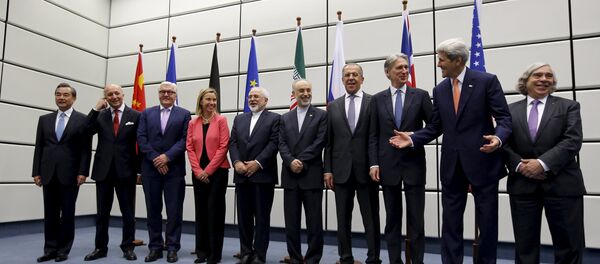Kristian Rouz – After the nuclear deal between Iran and six major powers was announced to have been reached on Tuesday, global oil prices took a blow, effectively dragging down shares of energy companies across the globe, as well as weighing on currencies of oil exporting nations.
Most stock markets in Europe were trading in the red on Tuesday as well due to the plunge in raw materials stock. Investors are also still wary of the developments in the Greek situation, where the $90 bln bailout deal, agreed upon of the international level, is yet to be approved by the nation’s parliament.
Crude prices dipped 2% in the US, with WTI oil trading at $51.13/bbl, while in London, Brent benchmark sells at $56.75/bbl, a 1.9% slide.
Consequently, oil-producing nations were Tuesday’s worst performers in the currencies markets. Russia’s ruble slid 0.79% against the greenback, now at 56.9976 per 1 dollar, while the Norwegian crown dropped 0.3% to 8.11 per dollar, and the Canadian dollar shed 0.4% against the greenback to its four month lowest at C$1.2796.
The US dollar itself was flat during Tuesday’s trading across the globe, standing firm against the yen at 123.35 per dollar, while the euro was at $1.1004.
Adding to the fresh million barrels of Iranian oil reaching the global energy markets on a daily basis, there are more downward factors for crude prices, among which are, most notably the rebound in the US oil-drilling rig count, rising oil production in the UK and the negative dynamics in oil stocks.
Meanwhile, global oil demand is projected to fall to 1.2 mb/d (millions of barrels per day) in 2016 from the current 1.4 mb/d, chiefly, due to the economic deadlock in mainland China and the falling energy imports in the US. Global oil supply is rising, having added 550 kb/d (thousands of barrels per day) this June only after certain oil-producers, including, but not limited to, Russia, increased crude output.
In Asia-Pacific, however, Tuesday’s trading was dominated by a different sentiment. Stocks gained mostly, as cheaper energy is a blessing for the local export-oriented industrial nations like Japan. The Nikkei 225 Index rose 1.5%, while the MSCI’s APEX shares outside Japan were up just 0.1% as mainland China’s stock rout resumed despite the severe governmental regulations.
The Shanghai Composite Index dropped 1.2%, while the broader CSI 300 index retreated 2.4%.
Now, the Iranian deal is not all bad news for other global oil exporters. The fact of the matter is, amidst the current oversupply of oil in the market, it will be very hard for Iran to find a niche to sell such a huge volume of oil. It is hardly possible, therefore, that Iran will manage to increase its oil exports by more than 100 to 300 kb/d by the end of this year, according to the data provided by the US bank Morgan Stanley.
Iran’s primary target market is mainland China, however, given the economic turmoil and decreasing imports (that fell 6.7% in June), it will be extremely hard for Tehran to compete against Saudi Arabia, Iraq and Kuwait for the share of the shrinking Chinese market.



